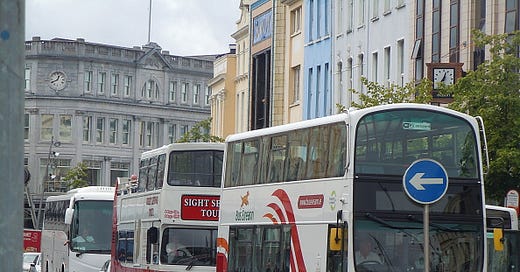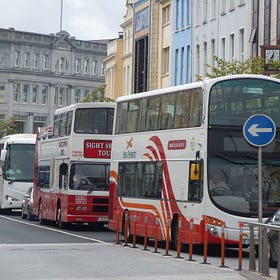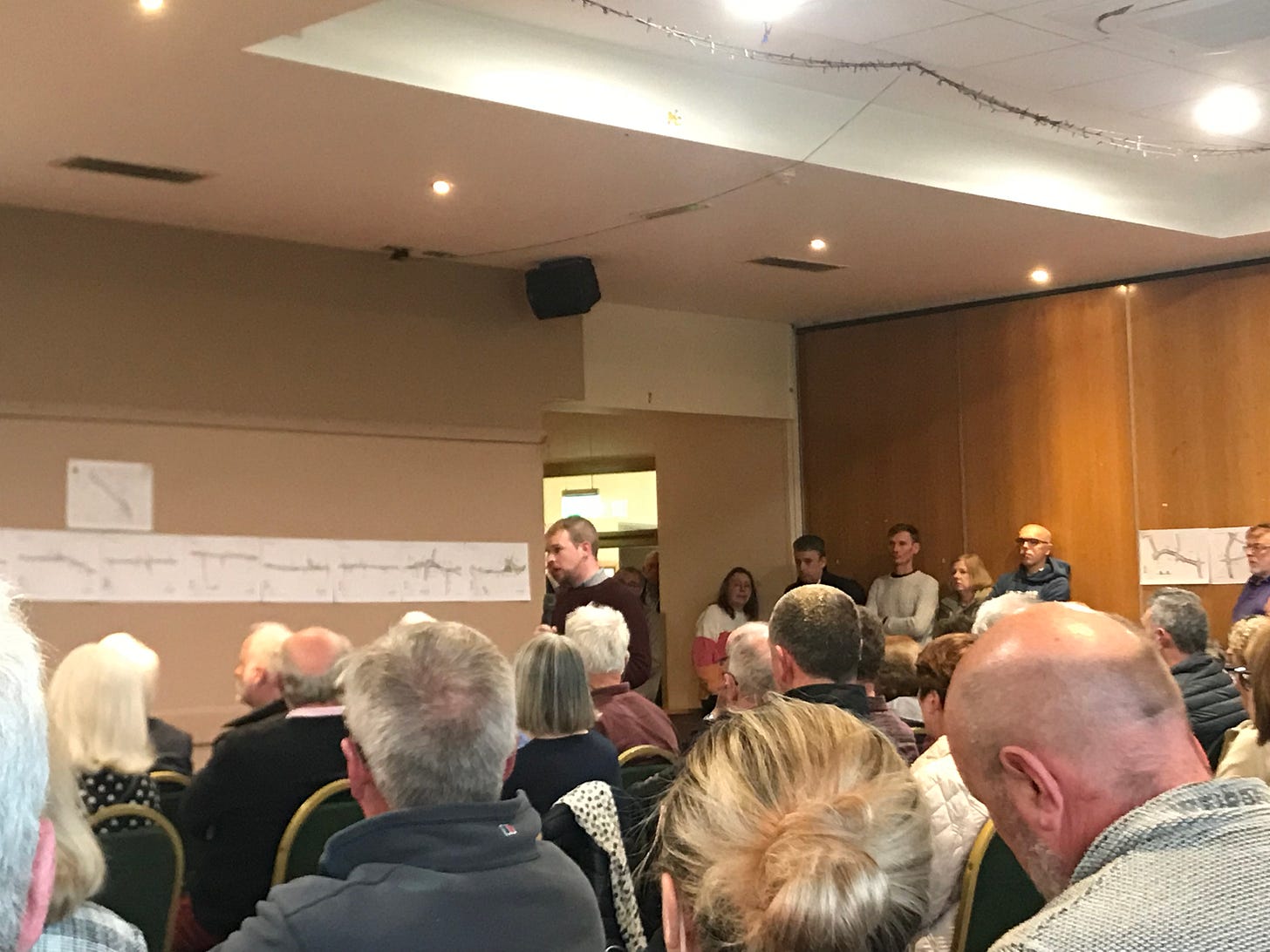Listen, engage and start again NTA told at Douglas BusConnects meeting
The second round of consultation for BusConnects in Cork is proving every bit as controversial at the first round.
A residents' group in Douglas told a meeting convened to discuss a proposed bus route that forms part of the transformative city-wide €600m BusConnects transport plan that they would fight the National Transport Authority (NTA) all the way to court to prevent the widening of the Douglas Road.
A group of Cork City councillors, along with Sinn Féin TD Donnchadh Ó Laoghaire, were present at the standing-room only meeting held at Nemo Rangers GAA club on Monday evening.
The meeting was organised by the Douglas Road Environment, Heritage and Community Group to update residents on the revised plan for the proposed bus corridor. The corridor stretches from Maryborough on the south side of the city, passing through Douglas village along the Douglas Road and terminating near Anglesea Street in the city centre.
It is one of 11 proposed sustainable transport corridors (STCs) aimed at improving the efficiency of the bus and cycle network in Cork and, ultimately, reducing dependence on cars.
According to the updated plans released earlier this year by the NTA, a section of the Douglas Road would be widened to accommodate a continuous minimum 1.5m-wide footpath on both sides of the road. As a result, approximately 52 trees would need to be felled, and 119 parking spaces would be removed along the 4.4km route.

“The policy is good, the plan isn’t”
The NTA was not invited to the public meeting, although it was advertised on social media and flyers were posted on poles along the Douglas Road leading up to the meeting. Before the meeting started, members of the media were asked to identify themselves and “refrain from taking any quotes." (Tripe + Drisheen is committed to independent journalism. We did not comply with this request as it was a public meeting with public representatives in attendance discussing a public issue.)
The main concern raised by the residents' group is that the NTA's plan for the Douglas Road will not result in a more efficient bus network but, instead, will significantly alter both the natural and built environment by diverting traffic onto nearby roads.
"The policy is good, but the plan isn't," said Ronan Margey from the Douglas Rd Environment, Heritage and Community Group, who presented the bus route proposals from Maryborough to the city centre in a slideshow. His group is urging the NTA to abandon their road widening plans and instead implement traffic calming measures and trial bus gates, which would prioritise buses during key times.
"Our primary goal is to protect our local environment and our neighbourhood," Mr Margey said. "We believe the Douglas Road possesses a unique character and holds a special place in Cork city's heritage. It also boasts a particularly well-established local environment that deserves preservation.”
He added that the group has communicated with the NTA their support for bus connectivity and active travel measures but "are fundamentally opposed to road widening."
The residents' group also urged the NTA to implement a traffic management plan and establish a comprehensive school bus transport network, which they argued would be more effective than the plans proposed by BusConnects.
Members of the Douglas Road community also expressed feeling "disrespected" by the NTA and claimed that their voices were not being heard. The updated proposal incorporates significant changes compared to the initial proposal, including the removal of an outbound bus lane on the Douglas Road. The bus gates on the Douglas Road would only be operational during peak morning and evening periods.
During a show of hands, the vast majority of the large crowd indicated their opposition to the plan for the Douglas Road. One attendee requested that the elected officials in attendance publicly state their stance on the current proposal.
Cork City councillors slam BusConnects plan
If planners and bureaucrats from the National Transport Authority are wondering how the public forums planned for later this month in Cork city will pan out then the contributions from Cork city councillors should give them a good idea what they’re in for.
NTA responds: 100 meetings with 35 groups
Tripe + Drisheen contacted the NTA in Cork outlining points raised at the meeting including concerns that the residents’ group was not being listened to.
In response, a spokesman for BusConnects said that the “Cork team has been engaged with various groups across Cork as part of the public consultation on the proposed development of eleven Sustainable Transport Corridors (STCs) for the city.
“During the first round of public consultation, we held almost 100 meetings with 35 different groups across the city to discuss our initial proposals. This included a number of meetings with the Douglas Road Environment, Heritage and Community Group.”
He added that the feedback received from the first public consultation informed the design process for the revised porpoals which were released on March 30.
“These include a number of key changes to STC I Maryborough Hill to City.”
The NTA said they “look forward to further engagement with residents and community groups across Cork”, but did not address concerns about the agency’s governance.
The political response
Michael McGrath, the Minister for Finance and Cork South Central TF for Fianna Fáil, was not in attendance, but issued a statement to the meeting in which he said he shared the concerns of the residents, adding that he does not support the proposals as they stand.
"In particular, the impact on property, the built environment, and biodiversity remains a serious concern," he said.
He called for meaningful engagement from the NTA and willingness to make further changes, adding that he had discussed the matter directly with Minister Eamon Ryan, who "has agreed to examine specifically the Douglas Road proposals."
Sinn Féin's Donnchadh Ó Laoghaire told the audience that what is currently on the table clearly does not work, adding that not enough research has been done on the impact the proposals will have on side roads off the Douglas Road.
"A lot of the questions proposed by this group to the NTA haven't been satisfactorily answered," he said.
The Sinn Féin TD said that while he does not support the current proposals for the planned bus route, he was not interested in "codding people," adding that he was not going to say that some widening does not make sense.
"I'm not going to say that, but clearly the extent and scale of the widening that is proposed is disproportionate, and given the impact that it has, there's no real evidence that it's going to work effectively."
All of the local councillors who spoke on the night voiced their frustration with the NTA and encouraged attendees to submit their proposals to the NTA. They added that they are powerless to affect change, other than making their own submissions.
Having taken the 206 to the meeting and “spending half my life waiting for the 207 bus," Cllr Lorna Bougue said she wanted BusConnects to work but added that the way the NTA has gone about implementing it has set "people against the ideas of the plan."
Cllr Bogue told the meeting she relies exclusively on the bus network, as well as cycling and walking to travel in the city.
The An Rabharta Glas-Green Left said the NTA’s plan was a "top-down plan," adding that from the beginning, the planning process has been poorly devised.
“It’s not the way to come up with a public transport system,” she said.
A controversial plan to build a bridge over the Mangala, a green belt with a greenway in the center of Douglas, as part of first round of consultation for BusConnects, was shelved late last year.
Cars, cars, cars and more cars
At times, the discussion touched on the central issue that is driving traffic, pollution and delays in Douglas: cars. Private car usage in Ireland has surged over the past 30 years, from 915,000 licensed vehicles in 1985 to 2.9 million in 2020, an increase of 213%, with private cars accounting for most of the growth, according to the Central Statistics Office (CSO).
According to CSO data, the number of passenger journeys in Ireland by bus and coach fell from 238 million in 2005 to 191 million in 2013, before rising to nearly 228 million in 2019.
If the government is going to meet targets on CO2 emissions, it needs to successfully roll out transport plans such as BusConnects and get people out of cars and onto buses and bicycles.
Transport represents about 18% of Ireland's carbon emissions, with road transport and private car usage carrying the most significant carbon footprint. Under plans outlined in 2022, the transport sector must reduce its emissions by 50% by 2030.
However, data from Eurostat released this week shows that while greenhouse gases decreased in almost all EU contries for the fourth quater of 2022, in Ireand they shot up by 12.3%.
Ballinlough Residents’ Association will meet on Wednesday May 17 at 7:30pm in The Ardfallen Centre, Ballinlough to discuss BusConnects. All are welcome.
Public consultation for the second round of BusCnnects is open until Thursday May 25. You can make a submission here.
8 new train stations are planned for Cork but will they be on track by 2030?
It will be 15 years next year since a train station was opened in Cork, and even then, when Midleton train station came back online in 2009, that was the result of opening a shuttered station. However, Iarnród Éireann/Irish Rail has plans to open eight train stations that would serve the commuter belt running from Cobh and Midleton in the east of the cou…








52 trees would need to be felled! Very environmental.